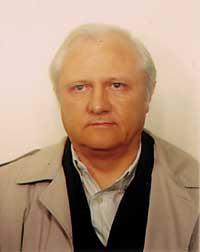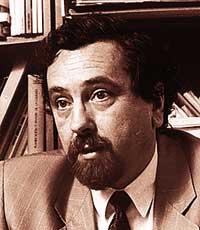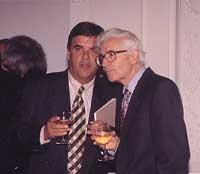“We felt we had a lot of social responsibility”
1997/11/01 Kaltzada, Pili - Elhuyar Zientziaren Komunikazioa Iturria: Elhuyar aldizkaria
Year 1972. At dusk two young people, Juanjo Gabiña and Mikel Zalbide, head towards the Don Bosco school on an old bike. It will talk to Luis Bandrés, who wants to make a concrete proposal on the project of combining Basque and science: Bring together in a group people who have worked together at the School of Engineers and are now students. This meeting was the seed of Elhuyar Kultur Elkartea. Year 1997. In the morning everyone has come in his car to the headquarters of Elhuyar Kultur Elkartea in Usurbil. By then, 25 years ago, the current ones will ask about the environment. We have made a concrete proposal: Let them reflect on the trajectory of these 25 years.

Environment prior to the creation of the group 1964-1970
Our youngest and most naive diners have been found as students at the School of Engineers in San Sebastian. Until then the Seminar was the only option to study for the students of Euskal Herria, except for the few who could send their children to Salamanca or Valladolid. They are a few years apart and have at some point worked together at the School.
Luis Bandres: The truth is that we also don't know very well why we started coming together in the Elhuyar Group. What we do see clear is that long before we began to hold these meetings on Saturday, the roll had a great concern: we thought that Basque could be a useful tool to talk, write, work and reflect on science. We met at the School of Engineers of San Sebastian and there we started working in the Basque Cultural Groups (EKT), and before that also on their own.
Andoni Sagarna: There were some previous quotes, but quite puristic for our image; we started working them and gradually we got into more tasks.
Luis Bandres: And all this for what? For nothing, the truth, to begin to form us. Keep in mind that what we discovered was an absolute desert. Regardless of the domestic, Basque was useless. Imagine there was no vocabulary.
Andoni Sagarna: At that time, if I'm not mistaken in the year 64, the dictionary of Plazido Mujika was published, which for us was impressive. Today we consider it almost as an archaeological product, but let us think it was the only one that existed then.
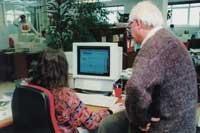
Juanjo Gabiña: In school, we actually got together with a very interesting group. I have often thought it was random to give all these conditions. On the one hand, it was us, the Basques, the best. On the other hand, we were representatives, we wanted new initiatives… the attitude was very positive. Subsequently, many Euskaldunes met at the School. We do a great job: we make and update word lists, translate jobs, produce articles and, in many cases, deal with social science issues.
Andoni Sagarna: And it must be borne in mind that the School let us organize ourselves in our own way. The atmosphere we discovered in Donostia was undoubtedly an exception. Although they did not have a special link with Basque culture, I would say that there was or was such a permit and even that they facilitated our work. Apika unintentionally or unknowingly...
Luis Bandres: It is true that we always had a very favorable atmosphere at the School. From the point of view of the years, I would say that the School thought we had more strength than we really had. Think about the social and political situation that was lived in Euskal Herria at this time, which really believed that we were very strong, but not for so long.
Juanjo Gabiña: But we had a lot of influence. For example, when we got in touch with the Culture Seminar in Deusto and other groups that showed up around here, they asked us what we did; they wanted to learn how we did it.
Luis Bandres: We also have to recognize that we had incredible complexes. We were Euskaldunes, we talked in Basque at home and with friends, but then, on physics or mathematics, we were not able to do it correctly.
Andoni Sagarna: Because we didn't know how this or that was said. We had everything to make, without a doubt, a frenetic atmosphere.
1970-1972
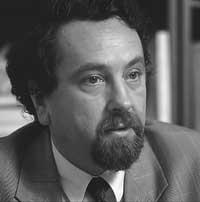
At the end of the race, some of our partners have started working. The School of Engineers begins to disperse this work group, dedicated entirely to professional tasks. The new generation has entered the School and although they continue to do things, some begin to worry about the lack of cohesion.
Luis Bandres: I suffered that descent while working, teaching physics at Don Bosco School. There were many Basques in Don Bosco, but when we entered the class the only language we used was Spanish. I continued to translate some works and create new materials in Basque, but I walked on my own or commenting with my friends.
Juanjo Gabiña: When we were in the last year of the race, Mikel Zalbide and I started talking about bringing together people who had been at the School. If I'm not mistaken, Mikel was the first to mention the question of forming a fixed group and we had it very close. At school we were doing some things about biology and the natural sciences, but, as we said, they were quite alone. We knew Luis and knew that Don Bosco was working. Without thinking twice we went to find him.
Luis Bandres: They arrived on an old bike and proposed me live to form a group. With the vice of work, we were all looking forward to starting work and soon we started to get together. Every Saturday afternoon, one knows how many years without failing.
Juanjo Gabiña: It was lucky to find Luis. At the School of Engineers he immediately incorporated some of his teammates and we, for our part, moved our project to many others. Then came Iñaki Azkune and the others and we started working as a group seriously.
Andoni Sagarna: In those meetings we discussed a lot about the normalization of Basque, but if we have to highlight something, the production capacity is what I like most about that time. That was our job.
Juanjo Gabiña: And we also entered areas that were not our own; social sciences, etc. We also dared to translate a little bit of the history of Euskal Herria...
Luis Bandres: At that time others were also working in these areas, but they did not reach our productive level. Many times it is said that engineers have a very square head and that once we put something in the helmet we do not leave it undone...
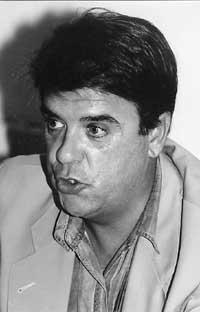
Andoni Sagarna: Of formation we were also different. We were taught to do things, little by little if you want, step by step, but we got results. Those who were engaged in discussing very abstract things struggled to carry out certain works. We, like screws, made articles and books.
Juanjo Gabiña: And we were very honest working. During the Saturday meetings the work was determined and throughout the week everyone did their corresponding part. The work dynamics were enormous.
New companions appear
Moreover, the Basque Summer University was born at the same time, and many ikastolas and Basque singers began to hold festivals. New premises are also established in the art world. Does the desert begin to bloom?
Luis Bandres: We participated from the beginning in the creation of the EU. Elhuyar was the only fixed group that was working seriously at that time, which met weekly and did the work in the pit. Soon we heard the intentions of others and together we began to clarify new concerns. In my opinion, the creation of the EU was largely possible on the part of Elhuyar and the members of our group had a great weight until the EU had the opportunity to advance on its own. The objective was the same: to remove the Basque language from the house and turn it into a real tool. We were dedicated to preparing materials, to attracting people, to propaganda and to making small “currency traffics”. Many people had knowledge of the EU through our group. During those years we went with cider everywhere, in catching people.
Juanjo Gabiña: We had great debates. Conciliation, for example, of deductions, etc. The expressions and words that we now consider fully settled then emerged after a long and profound debate.
Why then?
Obviously, it was not the ideal environment to start a group like Elhuyar. There has been no opportunity to do so, but they did so with the effort. A repeated question arises in the mind. Why then? What forces did the creators find in that environment that only offered obstacles?
Andoni Sagarna: The Elhuyar group was the result of a series of conditions that occurred in our time. For example, the first generation that attended university studies was ours, understood from the current perspective. Almost everyone who was until then forced to go through the seminary if they wanted to do something, and those who came to college also had to make naughty roads. They were then university students in Valladolid or Salamanca. The knowledge acquired in the Basque Country itself began to appear.
Luis Bandres: Elhuyar is also the result of his time, because in that environment we grow and learn how little we know. And in that society there was a great socio-political influence. In group meetings we did not discuss political issues, it was not our task, but they were there, from the beginning we saw very clear that we had to differentiate it. But we were Basque and nationalist in the last remnants of the dictatorship; we saw what was happening on the street and, necessarily, that political potential was very superficial. Then some have developed it, others have not, but there it was.
Andoni Sagarna: On many occasions it has been said that there must be a opposing force in order to move forward. And that was the situation we knew. The official atmosphere was, on the contrary, the enemy of what we did. But we were working in the Basque industry, they were creating things.
Luis Bandres: At that time, for example, the unified Basque danced...
Juanjo Gabiña: We had no problem meeting what Euskaltzaindia said, because it seemed logical to us. At a distance we could see debates about it; in our group there was no leap of generation, of different opinions at this level, and that is precisely what provoked in some environments really agile debates.
Luis Bandres: You will think that I am surprising against ourselves, but I have to mention the square head again. And it is that we were practical, we had to do things and, therefore, we consider it absolutely normal to accept what the Academy in charge of setting the language said, and we did so without just disgusting.
Working dynamics
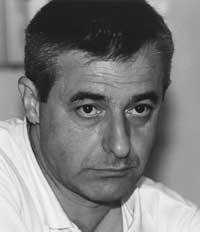
As has been said on several occasions, the members of the Elhuyar group were volunteers. They met every Saturday and at those meetings the work to be done during the week was decided. These meetings discussed, defined lines of work and related obstacles. In today’s eyes, one might think that these Sabbath meetings were the “heart” needed to materialize that special work dynamic.
Andoni Sagarna: Many are surprised by this dynamic of work that we have been working for many years. On the one hand, we thought that there was no other way; at that time, and under the conditions we are quoting, professional work could not be organized to reconcile Basque with science. We went out of our lives and understood our “duties” as volunteers.
Luis Bandres: And I, at least, have never felt such a great sacrifice, I did not feel that I gave up something to work in Elhuyar. We were used to it and today we continue like that. As usual, on Saturdays at the ranches, many of us stayed at home, stuck in our papers and, which can be the most surprising, we do it very at ease.
Andoni Sagarna: And because we have grown up like this or, after dinner, I still get to work almost every day. The work for Elhuyar has been done like this for years: at night, at dusk, on Sundays in the morning, etc.
Juanjo Gabiña: We were not especially masochistic, do not believe. Although on more than one occasion we disliked her with her girlfriend, we were very comfortable on Saturdays and after working, we went out to pose in a big company.
Andoni Sagarna: I see another deeper reason at the base. Our formation, the set of all these factors that have conditioned our nature, led us to have a social responsibility. We thought and thought we had something to do. Our education, both formal and unregulated, was like this: you live in this society, you were born into a culture and you have to contribute. This work dynamic was largely based on it.
Juanjo Gabiña: We clearly saw that something had to be done for the next generations. And that demanded tremendous work, which, as we have said many times, was the only way to work and we did it with desire.
Luis Bandres: Perhaps that is what I miss today. We have passed from one end to another in a very short time. Before, when we started the Elhuyar group there was nothing, the Basques who lived in the desert and also all the institutions were against, but we were excited, eager to work. Today, however, the professionalization of scrubs is focused on other ways; before doing things you have to be guaranteed a grant or similar, otherwise nothing is done. In many sectors work without illusion.
Andoni Sagarna: And, undoubtedly, professionalization is fundamental, more in this group. Good professionals are needed to influence the fields we are working on, but one does not necessarily have to deny the other. We have to vindicate the usefulness of work, have illusion and aim believing that what we are doing is valuable. Even in the simplest work, we have to feel that we are contributing something to this society in order to move forward. In the background, hence the permanence of Elhuyar and many other groups of the Basque industry.

Gai honi buruzko eduki gehiago
Elhuyarrek garatutako teknologia



